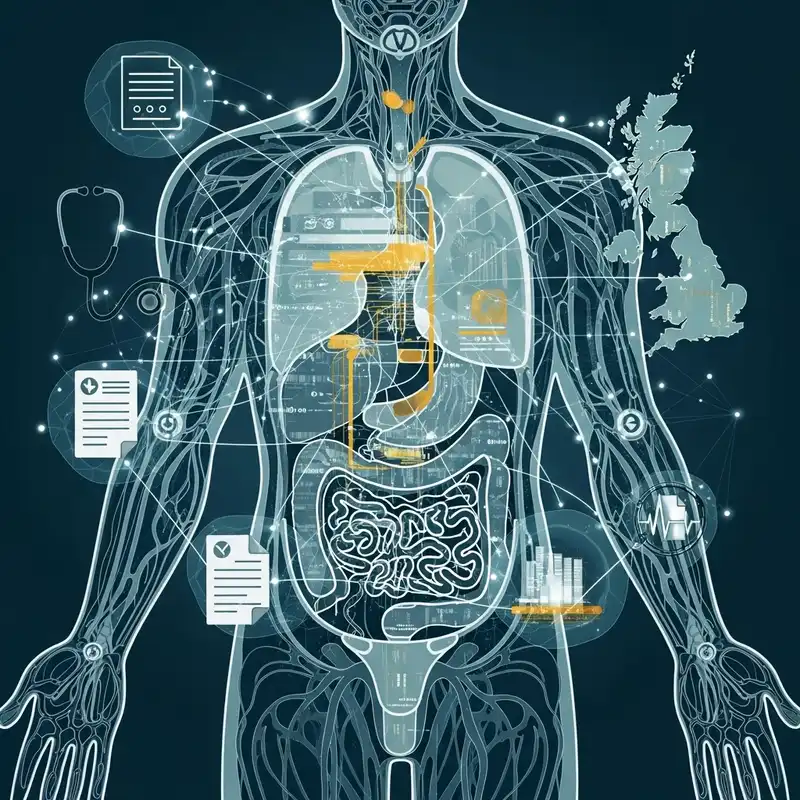TL;DR
As a self-employed professional in the UK, you are the engine of your business. Your ability to work directly generates your income. But what happens if that engine stalls?
Key takeaways
- A self-employed surgeon who develops a hand tremor can no longer perform surgery, even if they could work in an administrative or teaching role. With 'own-occupation' cover, they can claim.
- A freelance graphic designer who suffers a repetitive strain injury preventing them from using a mouse can claim, even if they are perfectly capable of working in a different field.
- A self-employed electrician who injures their back and can no longer work on-site can claim, even if they could theoretically answer phones in an office.
- 4 weeks
- 8 weeks
As a self-employed professional in the UK, you are the engine of your business. Your ability to work directly generates your income. But what happens if that engine stalls? An unexpected illness or injury could force you to stop working for months, or even years, leaving you without a financial safety net. Unlike employees who receive statutory sick pay, you're on your own.
This is where Income Protection Insurance becomes not just a sensible precaution, but an essential part of your financial toolkit. It’s designed to replace a significant portion of your income if you're unable to work due to sickness or an accident, providing a regular, tax-free monthly payment to cover your bills, mortgage, and living costs.
However, the world of income protection can seem complex. With terms like 'own-occupation', 'deferred periods', and 'benefit levels', it's easy to feel overwhelmed. This guide will demystify the process, providing you with the expert knowledge needed to choose the best income protection insurance for your unique self-employed circumstances. We'll explore the critical details, compare your options, and empower you to secure your financial future.
Own-occupation cover, deferred periods and benefit levels compared
Understanding these three core components is the single most important step in selecting the right income protection policy. Getting them right means your policy will pay out when you need it most. Getting them wrong could mean your claim is rejected or the support you receive is inadequate.
The Gold Standard: 'Own-Occupation' Cover
The 'definition of incapacity' is the clause in your policy that defines when you are considered unable to work and therefore eligible to claim. For the self-employed, especially skilled professionals, the 'own-occupation' definition is paramount.
'Own-Occupation' means you will be able to claim if you are medically unable to perform the specific duties of your own job.
Think about it:
- A self-employed surgeon who develops a hand tremor can no longer perform surgery, even if they could work in an administrative or teaching role. With 'own-occupation' cover, they can claim.
- A freelance graphic designer who suffers a repetitive strain injury preventing them from using a mouse can claim, even if they are perfectly capable of working in a different field.
- A self-employed electrician who injures their back and can no longer work on-site can claim, even if they could theoretically answer phones in an office.
Without this definition, an insurer could argue that because you can do some kind of work, you are not incapacitated and therefore not eligible for a payout.
How 'Own-Occupation' Compares to Other Definitions
Insurers offer less comprehensive definitions, which often come with lower premiums. However, this is a classic case of 'you get what you pay for', and the potential savings are rarely worth the significant extra risk.
| Definition Type | Description | Suitability for Self-Employed |
|---|---|---|
| Own-Occupation | You are covered if you can't do your specific job. | Excellent (The Gold Standard). Essential for specialists. |
| Suited Occupation | You can only claim if you can't do your own job or a similar job based on your skills and experience. | Poor. An insurer could argue you could be a consultant or teacher in your field. |
| Any Occupation | You can only claim if you are so ill you cannot do any kind of work at all. | Very Poor. Extremely difficult to claim on. Avoid this. |
| Work Tasks / Activities of Daily Living (ADLs) | Payout is based on your inability to perform a set number of tasks, like walking, washing, or lifting. | Very Poor. Not true income protection. You could be unable to do your job but still perform these tasks. |
Expert Verdict: For the vast majority of self-employed individuals, sole traders, and company directors, 'own-occupation' cover is the only definition that provides true peace of mind.
Choosing Your 'Deferred Period'
The deferred period (or 'waiting period') is the agreed amount of time you must be off work due to illness or injury before the policy starts paying out. You choose this when you take out the policy.
Common deferred periods are:
- 4 weeks
- 8 weeks
- 13 weeks (3 months)
- 26 weeks (6 months)
- 52 weeks (1 year)
The crucial rule is: the longer the deferred period, the lower your monthly premium.
How to choose the right deferred period:
The decision comes down to one simple question: "How long could I survive financially without an income?"
- Assess Your Savings: Tally up your business and personal cash reserves. How many months' worth of essential outgoings do you have? If you have £15,000 in savings and your essential monthly outgoings are £3,000, you have a 5-month buffer. A 13-week (3-month) deferred period would be a sensible choice.
- Consider Your Business Structure: Do you have contracts that pay out for a period even if you're not working? Do you have a business partner who can cover for a short time?
- Spousal Income: Does your partner's income provide a safety net that could allow you to choose a longer deferred period and save on premiums?
Example Scenario:
- Illustrative estimate: Maria, a freelance consultant, has £10,000 in an emergency fund. Her essential monthly bills are £2,500. She has a 4-month buffer. She chooses a 13-week deferred period to keep her premiums affordable while knowing her savings will cover the gap.
- David, a self-employed plumber, has limited savings but knows he couldn't last more than a month without income. He opts for a 4-week deferred period. His premiums are higher, but the policy provides the rapid support he needs.
Setting Your 'Benefit Level'
The benefit level is the amount of money the policy will pay you each month. It is paid tax-free.
Insurers will typically allow you to cover between 50% and 70% of your pre-tax profits. The reason it isn't 100% is to provide an incentive to return to work when you are medically able to do so.
How to calculate your required benefit level:
- Calculate Your Average Pre-Tax Profit: Look at your last two to three years of accounts or your SA302 tax calculations. Find your average annual profit, then divide by 12 for a monthly figure.
- Example: Annual profit is £60,000. Monthly profit is £5,000.
- Determine the Maximum Cover: An insurer would likely offer you up to 65% of this.
- Example: 65% of £5,000 = £3,250 per month.
- Calculate Your Essential Outgoings: This is the most critical step. Don't just guess. List everything you must pay each month:
- Mortgage or rent
- Council Tax
- Utility bills (gas, electricity, water)
- Food and groceries
- Loan and credit card repayments
- Car running costs (fuel, insurance)
- Childcare costs
- Business overheads that continue (e.g., software subscriptions, professional insurance)
Your required benefit level should, at a minimum, cover these essential outgoings. It's often wise to insure for the maximum amount available to you, as this gives you financial breathing room and reduces stress during a difficult time.
Why is Income Protection a Non-Negotiable for the Self-Employed?
Being your own boss offers incredible freedom, but it comes with a trade-off: you are solely responsible for your financial security. There is no employer safety net.
- No Sick Pay: If you don't work, you don't get paid. It's that simple. An employee might get weeks or even months of full pay while off sick; a self-employed person gets nothing.
- The UK's Growing Self-Employed Workforce: According to the Office for National Statistics (ONS), there were 4.3 million self-employed people in the UK in mid-2024. This huge segment of the workforce is operating without the traditional protections of employment.
- The Reality of Long-Term Sickness: We often underestimate the risk. However, industry data consistently shows that you are far more likely to be off work for an extended period due to illness than you are to pass away before retirement. Research from major insurers suggests that a 35-year-old has around a 50% chance of being unable to work for two months or more before they reach age 65.
Can You Rely on State Benefits?
For those unable to work due to illness or disability, the government provides the Employment and Support Allowance (ESA). While it offers a basic safety net, it is highly unlikely to be enough to maintain your lifestyle.
As of 2024/2025, the 'New Style' ESA pays a maximum of £90.50 per week for a single person during the initial assessment phase, rising to a maximum of £138.20 per week if you are placed in the 'support group' after assessment. (illustrative estimate)
Can your mortgage, bills, and food costs be covered by roughly £550 a month? For the vast majority of people, the answer is a resounding no. This stark reality highlights the gap that a personal income protection policy is designed to fill. (illustrative estimate)
How to Choose the Best Income Protection Policy: A Step-by-Step Guide
Navigating the market can be daunting, but a structured approach makes it manageable. Here’s how to build the right policy for you.
1. Choose Your Claim Period
This determines how long the policy will pay out for if you make a claim.
- Short-Term: These policies have a maximum claim period of 1, 2, or 5 years per claim. They are cheaper but offer limited protection. If you developed a chronic condition that prevented you from ever returning to your job, the payments would stop after the defined term, leaving you exposed.
- Long-Term: This is the most comprehensive option. The policy will pay out right up until a pre-agreed age, which is typically your planned retirement age (e.g., 60, 65, or 68). This protects you against career-ending illnesses or injuries. For true peace of mind, a long-term policy is strongly recommended.
2. Select Your Premium Type
- Guaranteed Premiums: The price is fixed when you take out the policy and will not change for the entire term unless you choose to alter your cover. This provides budget certainty and is generally the preferred option, as you know exactly what you'll be paying in 5, 10, or 20 years.
- Reviewable Premiums: The insurer can 'review' and increase your premiums over time. While they may start cheaper than guaranteed premiums, they can become significantly more expensive in the long run, especially as you get older. They offer less certainty for long-term financial planning.
- Age-Banded Premiums: These increase each year by a pre-set amount as you get older. They start very cheap but can become very expensive over the policy's life.
Expert Verdict: Guaranteed premiums offer the best long-term value and predictability for the self-employed.
3. Look for Valuable Added Benefits
Modern income protection policies are more than just a financial payout. Many leading insurers now include a suite of 'value-added' benefits that you can use from day one, even without making a claim. These can include:
- Virtual GP Services: 24/7 access to a GP via phone or video call.
- Mental Health Support: Access to counselling sessions and mental wellbeing apps.
- Second Medical Opinion Services: Get a diagnosis or treatment plan reviewed by a world-leading expert.
- Physiotherapy and Rehabilitation Support: Services designed to help you get back to work faster.
When comparing policies, don't just look at the price. Consider the value of these ancillary benefits. At WeCovr, we understand the importance of holistic wellbeing. That’s why, in addition to finding you the best insurance policy, we provide our customers with complimentary access to CalorieHero, our AI-powered calorie and nutrition tracking app, helping you proactively manage your health.
4. Consider Guaranteed Insurability Options (GIOs)
Life changes. You might get a larger mortgage, have children, or see your income increase significantly. A GIO allows you to increase your level of cover on the occurrence of specific life events without any further medical questions. This is an incredibly valuable feature, ensuring your cover can grow with your success.
Navigating the Application and Underwriting Process
Applying for income protection involves giving the insurer a clear picture of your health, lifestyle, and occupation. This is known as underwriting.
What to Expect
- Application Form: You'll be asked detailed questions about your job duties, your income, your health history, your family's health history, and your lifestyle (e.g., smoking and alcohol consumption).
- Financial Evidence: As a self-employed person, you'll need to prove your income. This is typically done by providing your last 2-3 years of fully certified accounts or your SA302 tax calculations from HMRC.
- Medical Evidence: The insurer may write to your GP for a medical report (a GPR). In some cases, especially for high levels of cover or if you have a complex medical history, they may ask you to attend a medical screening (a simple check-up with a nurse).
The Golden Rule: Be 100% Honest
It is absolutely vital that you disclose everything accurately. Do not be tempted to omit a past health issue or downplay your alcohol intake to get a lower premium. This is called 'non-disclosure', and if discovered, the insurer has the right to void your policy and refuse to pay a claim, leaving you with nothing.
Potential Underwriting Outcomes
- Standard Rates: If you're in good health with a low-risk occupation, you'll be offered the standard price.
- Exclusions: If you have a pre-existing condition, the insurer might place an 'exclusion' on your policy. For example, if you have a history of back pain, they may exclude any future claims related to your back. The rest of the cover remains in place.
- Premium Loading: For certain health conditions or a riskier occupation (e.g., a manual trade), the insurer may increase your premium by a certain percentage to reflect the higher risk.
- Postponement or Decline: In rare cases, if you have a very recent or serious health issue, the insurer may postpone their decision for a period (e.g., 6-12 months) or decline to offer cover.
This is where an expert broker like WeCovr adds immense value. We know the underwriting stances of different insurers. Some are more lenient with certain medical conditions or occupations than others. We can guide you to the insurer most likely to offer you the best possible terms for your specific circumstances.
Special Considerations for Company Directors and Business Owners
If you run your own limited company, you have another powerful option to consider: Executive Income Protection.
This works in a similar way to a personal plan, but the policy is owned and paid for by your business.
Key Differences and Advantages:
| Feature | Personal Income Protection | Executive Income Protection |
|---|---|---|
| Who Pays? | You, from your post-tax income. | Your Limited Company. |
| Tax Deductibility | Premiums are NOT tax-deductible. | Premiums are usually an allowable business expense, reducing your Corporation Tax bill. |
| Benefit Payment | Paid directly to you, tax-free. | Paid to the business. The business then pays it to you via PAYE (subject to NI and Income Tax). |
| Benefit Level | Up to 70% of pre-tax profit. | Can cover up to 80% of your gross salary and dividends. |
Why Choose Executive Income Protection? The main driver is tax efficiency. Because the premiums are treated as a business expense, the net cost to you and your business is significantly lower. It allows you to use pre-tax company profits to fund your protection.
It's an excellent way to provide a valuable 'employee' benefit for yourself as a director, mirroring the sick pay schemes found in larger corporations.
It is important to differentiate this from Key Person Insurance. Key Person cover is designed to protect the business by providing a lump sum to cover lost profits or recruitment costs if a vital director or employee is unable to work. Executive Income Protection is designed to protect the individual's income. Many company directors will have both.
Wellness and Health: Proactive Steps to Protect Your Income
While insurance provides a financial safety net, the best way to protect your income is to protect your health. As a self-employed individual, investing in your wellbeing is a direct investment in your business continuity.
Diet and Nutrition
A balanced diet fuels your brain and body, improving focus, energy, and immunity. Simple swaps like reducing processed foods and increasing your intake of fruits, vegetables, and whole grains can have a profound impact. Using a tool to monitor your intake can be incredibly helpful. As a WeCovr client, you get complimentary access to our CalorieHero app, an AI-powered tool to help you track your nutrition and make healthier choices effortlessly.
Sleep
Lack of quality sleep impairs cognitive function, decision-making, and physical health. Aim for 7-9 hours per night. Establish a routine: go to bed and wake up at similar times, avoid screens before bed, and ensure your bedroom is dark and quiet.
Physical Activity
The NHS recommends at least 150 minutes of moderate-intensity activity a week. This is especially crucial for those in sedentary roles. Regular movement combats stress, reduces the risk of chronic illness, and prevents musculoskeletal issues. Take short breaks to walk and stretch throughout the day.
Mental Wellbeing
Self-employment can be isolating and stressful. Proactively manage your mental health.
- Set Boundaries: Define your working hours and stick to them.
- Take Breaks: Schedule regular holidays and time off to recharge.
- Connect with Others: Network with other freelancers or join local business groups.
- Practice Mindfulness: Techniques like meditation can significantly reduce stress levels.
By taking proactive steps to manage your health, you reduce the likelihood of needing to claim on your income protection policy in the first place.
Conclusion: Your Most Valuable Business Asset
As a self-employed professional, your ability to earn an income is your most valuable asset. Protecting it is not a luxury; it's a fundamental business decision. A well-structured income protection policy provides the certainty that your financial life won't be derailed by an unexpected health crisis.
By focusing on the 'own-occupation' definition, carefully selecting a deferred period that matches your savings, and insuring a benefit level that covers your essential costs, you can build a robust safety net. Choosing a long-term claim period and guaranteed premiums will ensure that this protection is both comprehensive and predictable.
The market is complex, but you don't have to navigate it alone. Working with a specialist broker ensures you get expert, impartial advice tailored to your unique needs as a self-employed individual or company director. Securing your income is securing your future – and that's the best investment you can make in yourself and your business.
Is income protection insurance tax-deductible for the self-employed?
What happens if I have a pre-existing medical condition?
How much does income protection for the self-employed cost?
- Your Age: The younger you are when you take out the policy, the cheaper it will be.
- Your Health and Lifestyle: Smokers and those with pre-existing conditions will pay more.
- Your Occupation: A desk-based job is lower risk and therefore cheaper to insure than a manual trade.
- The Benefit Level: A higher monthly payout means a higher premium.
- The Deferred Period: A longer waiting period (e.g., 26 weeks) is cheaper than a shorter one (e.g., 4 weeks).
- The Policy Term: A long-term policy to age 65 will cost more per month than a 2-year short-term policy.
Can I get income protection if I work in a high-risk job?
What is the difference between Income Protection and Critical Illness Cover?
- Income Protection pays a regular monthly income if you are unable to work due to a wide range of illnesses or injuries (e.g., back pain, stress, a broken leg). It's designed to replace your salary.
- Critical Illness Cover pays out a one-off, tax-free lump sum if you are diagnosed with one of a specific list of serious conditions defined in the policy (e.g., a specific type of cancer, heart attack, stroke).
Sources
- Office for National Statistics (ONS): Mortality, earnings, and household statistics.
- Financial Conduct Authority (FCA): Insurance and consumer protection guidance.
- Association of British Insurers (ABI): Life insurance and protection market publications.
- HMRC: Tax treatment guidance for relevant protection and benefits products.
































